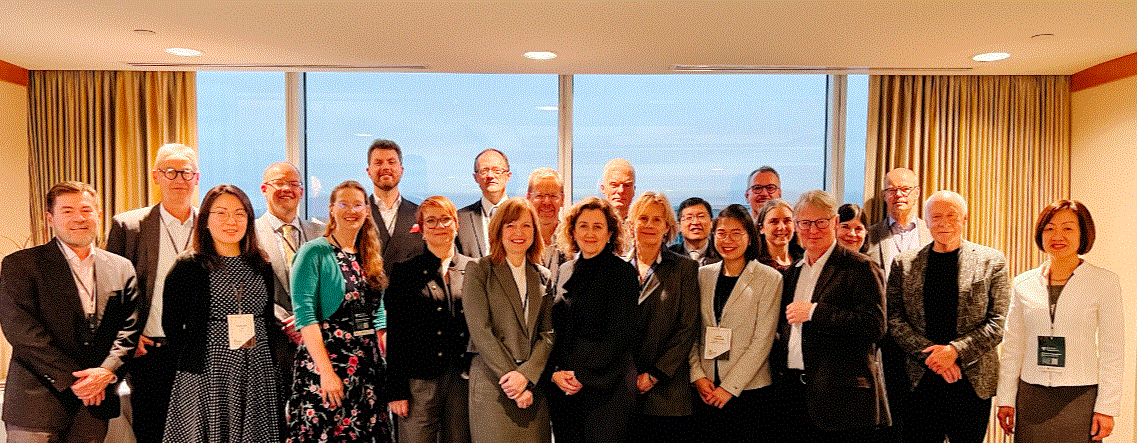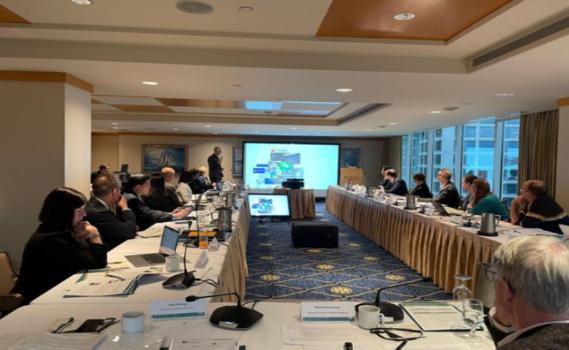PISA High Performing Systems for Tomorrow (HPST)
|
© Copyright Templeton World Charity Foundation 2023 |
HPST Background
|
|
HPST report and publications
HPST 2023 Conceptual Framework
|
As part of the PISA High Performing Systems for Tomorrow (HPST) project, established in 2018, this publication delves into the transformative journey of education systems around the world. Initially focusing on jurisdictions with high performance in PISA, HPST embarked on a dual-path exploration: comparative research into learning systems and high-level policy dialogues on the future of education in the AI era. This synthesis, a product of discussions and research, seeks to redefine education's purpose in the 21st Century. It argues for a shift towards 'human flourishing,' a concept that transcends traditional educational objectives and aligns with the dynamic, AI-integrated world.
Entering its second phase in 2022, HPST is looking deeper into 'Education for human flourishing.' This document, evolving from a baseline paper published by the Centre for Strategic Education, seeks to fortify and elaborate a set of foundational principles. In setting out an aspirational vision for the future of education, that equips young people to navigate a complex world and achieve well-being, it draws inspiration from the OECD Education 2030 Learning Compass. Emphasising the unique challenges and opportunities presented by AI, it proposes a new educational paradigm, distinguishing flourishing from well-being, clarifying the concept of agency in learning, and highlighting specific competencies relevant to ‘Education for human flourishing’. Subsequent iterations will offer perspectives on metrics and system design, shaping a new narrative for secondary education and guiding the future trajectory of PISA.
|
|
This 2023 Conceptual Framework is a collaborative effort, bringing together a diverse group of contributors from across the globe. Key jurisdictions that have played a vital role include Australia, British Columbia (Canada), Estonia, Finland, Germany, Singapore and the United Kingdom, each bringing their unique insights and experiences in education. The individual contributions of thought leaders and experts in the field have been invaluable: Valerie Hannon, Kristjan Kristjansson, Otto Scharmer and Tyler VanderWeele provide deep expertise and innovative perspectives. The coordination and synthesis of these inputs have been managed by the OECD secretariat. |
|
HPST participants (Phase Two)
|
|
Jurisdictions(Permanent Secretaries)AustraliaBritish Columbia (Canada)EstoniaFinlandGermanySingaporeUnited Kingdom |
Organisations(CEOs)National Centre on Education and Economy International Baccalaureate Organisation
|
|
Competencies and Assessment
Competenciescontribute to valued outcomes for societies and individuals; help individuals meet important demands in a variety of contexts; and are not just for specialists but for all individuals. They combine knowledge, skills, values and attitudes.
|
Assessmentshould enable a continuing understanding of the learning of each student, guide that student's development and contribute to subsequent judgement. |
|
|
|
-
Adaptive problem solving
|
Competency: adaptive experts are capable of varying their behaviours and understanding to address new challenges and situations. They do this by applying what they have learned in one context to another context, drawing on higher-order thinking, learning and decision-making skills, in order to solve complex problems. |
|
|
Assessment strategy: explore the extent to which students, drawing on ICT skills, can mobilise multiple competencies in tandem to solve problems, in: -creative design -searching for and evaluating information -managing interpersonal relations |
-
Ethical decision making
.jpg) |
Competency: wise people seek to understand the context in which a problem is embedded, they explore different possibilities for how an event might unfold and they endeavour to balance multiple interests through searching for compromise (perspectival metacognition) |
|
Assessment strategy: explore the individual's capacity to reason about a personal or group dilemma. To what extent do they exhibit humility; an ability to balance viewpoints, perspectives and contexts; and an understanding of conflict resolution and compromise? Trained experts score participants against sample responses (novice/expoert) |
-
Aesthetic perception
|
Competency: aesthetic perception refers to the appreciation of beauty. Beauty is a property of experiences. To count as beautiful, "an experience must be interesting enough to behold, have a form that is memorable and invite revisiting" (Gardner) |
|
|
Assessment strategy: Art viewing is notable for its unique blending of bottom-up processing of artwork features (form, attractiveness) with top-down contributions of memory, personality and context. These are further united with even higher-order, complex, and often effortful cognitions where we reespond to our initial reactions, discover complex meanings, novelty and make judgements (Vienna Integrated Model) |
Policy Dialogue
Singapore (November 2022)
The HPST Singapore Policy Dialogue, held on 27-30 November 2022, marked a significant milestone in the evolution of global education strategies, focusing on the transition towards "Education for Human Flourishing." Andreas Schleicher's opening remarks highlighted the need for a new education narrative, one that balances mastery and competence with personal well-being and connectedness, underscoring the dialogue's goal to catalyse policy discussions across various dimensions including strategy, research, and leadership development.
The dialogue explored current assumptions underpinning education systems worldwide and participants shared their unique challenges and approaches towards education reform. Sessions delved into the conceptualization of Education for Human Flourishing, discussing competencies like adaptive problem-solving, ethical decision-making, and aesthetic perception in relation to broader educational goals. The dialogue also addressed the impact of AI on education, suggesting a shift towards preparing students for a world where AI complements human capability rather than dictates educational priorities.
The concluding discussions focused on the practical aspects of implementing transformative education changes, stressing the importance of long-term vision, stakeholder consensus, and the development of metrics that align with the goals of human flourishing. The dialogue underscored the pivotal role of education in preparing individuals not just for economic participation but for meaningful lives in an increasingly complex world.
Vancouver (January 2024)
 |
The HPST Vancouver Policy Dialogue, held on 23-26 January 2024, offered a profound exploration into the evolution of education systems towards fostering human flourishing in the context of rapid AI advancements. Central to the discussions were the presentations of principal papers from international experts, which proposed a framework built on competencies essential for human flourishing, including adaptive problem-solving, ethical decision-making, and aesthetic perception. Reflecting on PISA 2022 insights, the dialogue underscored the significance of psychological well-being, parental engagement, and effective technology use in education, aiming to balance well-being with academic excellence.
Key themes included the integration of new competencies alongside traditional ones, the mobilization of education stakeholders around a unified narrative, and the critical role of learning environments in enabling this educational shift. The dialogue also delved into leadership and teacher competencies necessary for realising education for human flourishing, emphasizing the need for leadership that is inclusive, distributed, and grounded in socio-emotional skills.
The Vancouver discussions concluded on a consensus on the urgent need for systemic shifts in education to accommodate the complexities of the AI era, advocating for a holistic approach that encompasses system design, teacher training, and student assessment. This forward-looking dialogue sets the stage for a transformative education agenda that aligns with the principles of human flourishing, underscoring the imperative for global education systems to adapt and thrive in an increasingly interconnected and technologically advanced world.
 |
 |
*Reading materials:
- Reflections on Competences for Human Flourishing (Finland)
- Seven Core Capacities for Co-creating the Emerging Future (Otto Scharmer)
- Learning Environments for Flourishing: Spaces, Themes and Principles for Design (Singapore)
- Towards an Education Workforce dedicated to Human Flourishing (Valerie Hannon)
Get in touch to keep updated and help share future work:

Related Documents




.jpg)

.jpg)
.jpg)
.jpg)